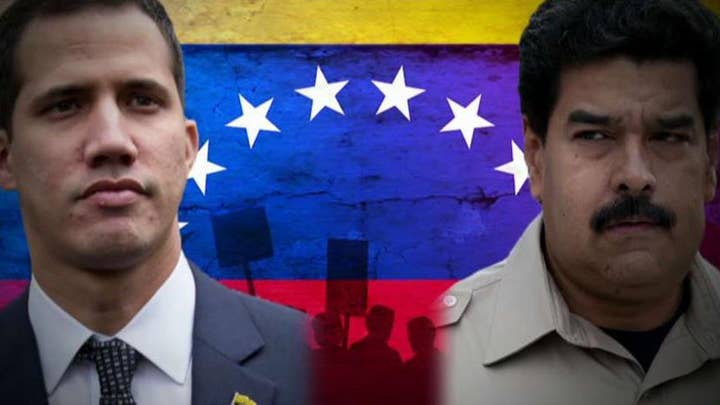Trump honors US-recognized Venezuelan President Guaido at State of the Union
Trump honors US-recognized Venezuelan President Guaido at State of the Union
President Trump met at the White House on Wednesday with Venezuelan opposition leader Juan Guaidó – giving a big bump to the South American politician as he wraps up an international trip to garner support for his bid to oust his country’s strongman leader Nicolás Maduro.
The closed-door meeting between Trump and Guaidó comes a day after the Venezuelan received a White House invitation to the president’s State of the Union address, where Trump praised Guaidó and promised Washington’s support for his cause.
"Mr. President please take this message back that all Americans are united with Venezuelans in their righteous battle for freedom," Trump said Tuesday night to Guaidó, who is recognized by the United States and nearly 60 other countries as Venezuela’s legitimate leader despite his unsuccessful attempts to actually remove Maduro from office.
PLAN FOR VENEZUELAN MIGRANTS TO SETTLE IN BRAZIL SEES US SUPPORT
Trump’s embrace of Guaidó seemed to quell concerns that the president had soured on Guaidó’s chances of actually replacing Maduro as Venezuela’s leader. Vice President Mike Pence and other top officials met in December to reexamine their approach in pushing for democracy in the South American nation.
Guaidó has developed deep ties with a number of Republican lawmakers in Congress – most notably Florida Sens. Marco Rubio and Rick Scott. Florida is home to the largest Venezuelan immigrant population in the U.S. and is seen as a hotbed for anti-Maduro activism much as it has historically been for Cubans opposed to the Castro regime.
Home to the world’s largest oil reserves, Venezuela was for decades an economic leader in the western hemisphere and, despite a massive gap between rich and poor, was a major destination for neighboring Colombians and other Latin Americans fleeing their less prosperous and more troubled homelands.
But in 1999, with the rise to power of Hugo Chávez – whose social and economic reforms initially endeared him to the poor but also set up an unsustainable system of state spending – Venezuela’s economy began to creep toward a crisis. The situation has been exacerbated by Maduro, Chávez’s successor, who took power in 2013, and by a plunge in global oil prices in 2015.
Venezuela has been gripped by widespread malnutrition, disease and violence, and critics accuse Maduro of unfairly winning an election last year for a second six-year term by banning his popular rivals from running and jailing others.
Today, an estimated 4.5 million Venezuelans have emigrated from the country of 30 million, leaving behind crumbling infrastructure, broken hospitals, power failures and gasoline shortages with mile-long lines at filling stations across much of the South American nation.
CLICK HERE TO GET THE FOX NEWS APP
Guaidó, 36, rose to prominence a year ago, named leader of the opposition-led National Assembly. In this position he claimed presidential powers, vowing to oust Maduro and reverse the political and social crisis.
He won backing from the U.S. and nearly 60 nations that considered Maduro's 2018 election a fraud and blamed his socialist policies for the crisis that's driving mass migration and threatening the region's stability.
Maduro, however, has maintained power with firm backing of the military and key foreign allies, including Russia, China, Cuba and Turkey. Russian Foreign Minister Sergey Lavrov is expected to visit Caracas in the coming days.
The Associated Press contributed to this report.







